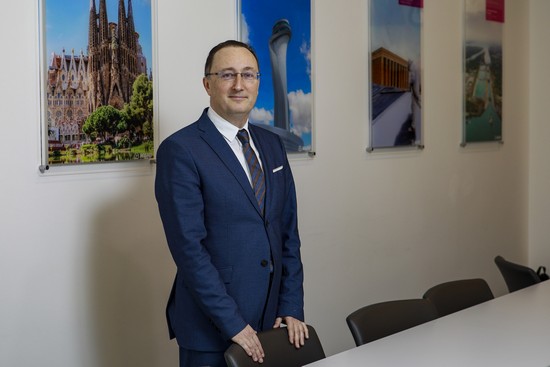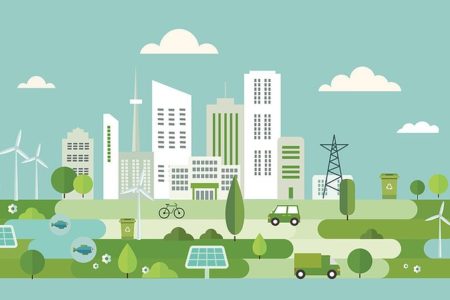World giant MAPEI, which develops the best and most innovative solutions for design and construction in accordance with environmental sustainability principles, undertakes innovative projects within the scope of the European Green Agreement. With the “Arena del Futuro” project, MAPEI has set one of its main goals as “zero emission mobility of products and individuals in the process leading to carbon neutrality”.
One of the biggest transformation projects of this century by the European Union (EU), the “European Green Deal / Green Deal” aims to reduce carbon emissions by 50% by 2030, and to zero carbon emissions by 2050. While a greener and cleaner world is planned with the European Green Agreement, 
With the European Green Consensus, key issues such as providing sustainable farming methods, protecting biodiversity, using renewable energy sources that will reduce carbon emissions, adopting environmentally friendly production methods in the industry, minimizing carbon emissions from the activities of the construction sector, and taking the necessary measures to eliminate environmental pollution. It is planned to provide incentives for the development of projects at points.
OLD AND NON-EFFICIENT BUILDINGS WILL BE RENEWED
Selman Tarmur, General Manager of Mapei Turkey, stated that within the scope of the Green Agreement, old and inefficient buildings will be extensively renovated by the EU Commission and made the following statements on the subject: “The use of materials that will contribute to the circular economy comes to the fore during these renovations. It can be foreseen that this development will create new opportunities for the cement and construction industry. In this context, it is vital to keep the carbon footprint of intensive energy industries such as iron-steel and cement and to reduce emissions with modern technologies.”
REGULATION WILL BEGIN FIRST FROM THE CLINKER INDUSTRY
The Border Carbon Regulation is expected to come into effect by covering the clinker (cement main raw material), limestone (lime) and gypsum (plaster) sectors, which have high trade volumes. Experts state that products such as paper, organic chemicals, glass and ceramic products, coke, fertilizer, refinery products, basic iron-steel products and aluminum will be covered in the following stages.
Selman Tarmur, General Manager of Mapei Turkey, predicts that the cement industry will be most affected by the tax to be paid for carbon emissions originating from exports to the EU market; “Considering the sectoral carbon efficiency, possible income losses in exports to the EU (if the carbon price is 30 or 50 euros per ton) are 13.2% – 22% in the cement sector; It is calculated as 1.7% – 2.8% in iron and steel. It is also evaluated that border carbon regulation may cause negative macro-economic effects, but these negative effects can be offset by a reduction in other taxes faced by producers, and thus the environmental policy that can be put forward can actually turn into a gain.”
MAPEI REMAINS ON ITS SUSTAINABLE PRINCIPLE
Selman Tarmur, General Manager of Mapei Turkey, emphasized that one of the main commitments of Mapei is to offer the best and most innovative solutions for “designing and building in accordance with environmental sustainability principles” and continued:
“In this direction, we contribute to the construction of quality and durable buildings with innovative, recycled, ultra-light raw materials developed to reduce energy consumption and have very low volatile organic compound emissions. As Mapei Group, we continue to produce solutions with our newest project, Arena del Futuro, a global consortium project that aims to ensure the zero-emission mobility of products and individuals in the process towards carbon neutrality.”
REVOLUTIONARY PROJECT
Tarmur describes what makes this project unique, which he describes as revolutionary, as follows: “For the first time in the world, a pool of important international industrial companies supported by prestigious universities and institutions will collect all data on this futuristic technology that will emerge over the next few months. collaborating to analyze it.”
Selman Tarmur, while aiming to contribute to the circular economy as Mapei, explained another of his initiatives as follows: “Another initiative in the circular economy is the signed agreement between IREN and MAPEI SpA on the use of thermoplastic polymers derived from innovative recycling processes to create long-lasting and sustainable road surfaces. circular economy agreement.
Mapei General Manager Selman Tarmur listed the risks and opportunities for Turkey within the scope of the European Agreement as follows:
– The aforementioned carbon tax to be applied to exports to the EU in carbon emission reduction and the introduction of new standards for eco-labeling means extra burden for those who cannot complete the harmonization process in this area.
– Accordingly, if improvement and harmonization studies are not carried out, Turkey may experience a market loss in exports. In addition, according to the Green Deal, the EU now requires candidate countries to “ratify and effectively implement” the Paris Agreement for trade agreements with other countries.
– On the other hand, the Green Deal may create an opportunity for Turkey to support low-carbon production and thus increase its market share in exports to EU countries by gaining an advantageous position compared to high-carbon countries.
– In this context, a suitable economic environment can be created for Turkey to support R&D projects in line with its carbon neutral target, to focus on clean energy investments in all sectors and to transform into carbon zero production processes. Likewise, it is possible for businesses that will adapt quickly to the Green Deal targets to gain a relative competitive advantage.
– In addition, the Green Deal can enable governments and credit institutions to allocate resources to clean energy production and technologies that will improve this production. As a result, developments in production technologies may trigger a sustainable and environmentally friendly industrial revolution in our country.


